KU Announces New Self Graduate Fellows
Eight doctoral students at the University of Kansas have been selected to receive prestigious Madison and Lila Self Graduate Fellowships as they begin the 2008-09 academic year. Six of the students are pursuing doctorates in engineering.
The graduate students are regarded as tomorrow’s leaders in their areas of research, which range this year from biomedical and engineering topics, such as developing better physical therapies for Parkinson’s disease patients and inventing devices to aid in recovery for stroke patients, to sustainable technologies such as designing cars, wind turbines or buildings that conserve nonrenewable energy resources. Others are exploring topics that combine biology or geology with paleontology to better understand plant reactions in the last ice age to concentrations of carbon dioxide or to map the distribution of fossils through time.
Self Graduate Fellowships are four-year awards to new doctoral students that cover full tuition and fees, provide a $24,500 annual payment and include a unique development program. The Fellow Development Program is a distinctive feature of the Self Graduate Fellowship. It provides general education and training in communication, management and leadership to assist Self fellows in preparation for future leadership roles, complementing the specialized education and training provided in doctoral programs.
The fellowship’s mission is to identify and recruit exceptional doctoral students who demonstrate the promise to make significant contributions to their fields of study and society as a whole.
There are 33 Self fellows, including the eight announced today. A total of 115 graduate students have benefited from the fellowship since it was established at KU.
Madison “Al” and Lila Self of Hinsdale, Ill., launched and permanently endowed the Self Graduate Fellowship in 1989, motivated by their strong belief in the vital importance of developing leadership for tomorrow. Al Self is a 1943 KU graduate in chemical engineering. Lila Self is a native of Eudora and attended KU with the Class of 1943.
The eight new Self fellows are:
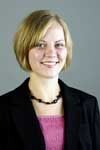
Sommer L. Amundsen
Sommer L. Amundsen in bioengineering is involved in multidisciplinary research developing effective physical therapies for people with Parkinson’s disease. Amundsen hopes to use her knowledge of the science of movement in industry, therapy and possibly entrepreneurship. During her first year in the bioengineering program at KU, she helped design a tool to be used in spine surgery. She received bachelor’s degrees in engineering and dance from Hope College in Holland, Mich., in 2007. As part of her senior design project at Hope College, she helped design a water system for a small rural village in Cameroon through Engineers Without Borders. She is from Coon Rapids, Minn.
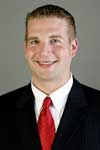
John Paul Anglin
John Paul Anglin in electrical engineering and computer science has research interests in digital signal processing with a focus on synthetic aperture radar. Anglin’s long-term goals are to be involved with research and the application of that research. He received a bachelor’s degree in electrical engineering and graduated summa cum laude from Auburn University in 2002. Since 2003, Anglin has worked in the nuclear power industry for Engineered Solutions Inc. as a lead engineer on various nuclear power projects. He obtained his professional engineer’s license in fall 2007. At Auburn, Anglin participated in research focused on the detection and discrimination of landmines using pulse induction and continuous wave technologies. He also participated in the modeling and construction of a nonlinear magnetic accelerator. He is the son of Phillip and Judy Anglin. He is married to Rian Williams, also from Valley. The couple reside in Olathe, Kan.
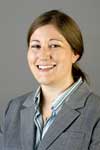
Heather I. Eilers
Heather I. Eilers in civil, environmental and architectural engineering has long-term goals that include establishing her own construction company as well as mentoring and teaching those in the construction industry. Since 2001, Eilers has worked for J. E. Dunn Construction in Kansas City, Mo. She became a LEED (Leadership in Energy and Environmental Design) accredited professional in 2003. This led to her role at J. E. Dunn as a lead project manager on Staley High School in North Kansas City. The project is on track to be a LEED silver certified project. Eilers obtained her professional engineer’s license in 2007. She received a bachelor’s degree in construction engineering from Iowa State University in 2001 and master’s degree in architectural engineering from KU in 2007. She is the daughter of Debbie and Rick Burns of Washington, Kan..
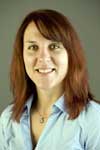
Laci M. Gerhart
Laci M. Gerhart in ecology and evolutionary biology has focused her research on understanding how plants responded to changes in atmospheric carbon dioxide concentrations from the last ice age and how they will respond in the future. Her long-term goal is to create a nonprofit ecological organization that strives to overcome the negative effects of global changes on plant species. Gerhart received a bachelor’s in biology from KU in 2006. Following her graduation, she spent a year working for the Institute for Educational Research and Public Service in KU’s School of Education. At KU, Gerhart was a Watkins-Berger Scholar, which is awarded to the top 100 female students from Kansas. She also volunteers for Operation WildLife, a nonprofit animal rehabilitation center, and has worked as a student park ranger at Clinton Lake for the U.S. Army Corps of Engineers. She is the daughter of Bruce and Denise Gerhart of Hutchinson, Kan., and is a graduate of Hutchinson Senior High School.
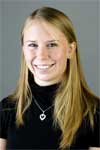
Katrina M. Legursky
Katrina M. Legursky in aerospace engineering is interested in research in aerodynamic performance and composite materials. She hopes to open her own firm to design more efficient cars and wind turbines. Long term, Legursky, who is a sailor and a private pilot, is interested in designing an America’s Cup yacht. She received a bachelor’s degree in physics and astronomy from Benedictine College in Atchison in spring 2008. Her research experience includes small telescope observations at Benedictine, cryogenic dark-matter research at the University of Minnesota and research with KU’s Center for Remote Sensing of Ice Sheets. At Benedictine, Legursky was captain of the women’s rugby team and president of the physics and astronomy club. She is the daughter of Clare and Wes Legursky and is a graduate of Marian Central Catholic High School in Woodstock, Kan.
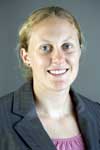
Corinne E. Myers
Corinne E. Myers in geology is focused on research in paleobiogeography. Applying computer mapping and environmental modeling techniques, Myers will analyze the distribution of fossil species in space and time to see how species responded to environmental change and how species interacted ecologically with each other. Her career plans include research, teaching and science writing. She received a bachelor’s degree in science of earth systems and graduated cum laude from Cornell University in 2004 and earned a master’s degree in igneous geochemistry from Brown University in 2008. At Cornell, Myers worked as a research assistant analyzing soil core samples for fire history and was on the varsity crew team for four years. Her graduate work at Brown focused on understanding magmatic composition and flow beneath mid-ocean ridges. Before enrolling at Brown, Myers worked as assistant to the director of the Paleontological Research Institution and the Museum of the Earth in Ithaca, N.Y. She is the daughter of Howard Myers and Cyndee Ludt of Tuscon, Ariz.
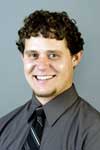
Griffin W. Roberts
Griffin W. Roberts in chemical and petroleum engineering has career goals that include working for a national laboratory or startup company with a focus on energy generation or biocatalysis. He received a bachelor’s degree in chemical engineering and chemistry from the University of Illinois at Urbana-Champaign in 2007. His research experiences include a summer at the J. R. Randall Research Center for Archer Daniels Midland Co., and two summers at the University of Illinois in two research groups. His university research focused on microelectronics and microchemical systems with emphasis in membrane protein crystallization. After receiving his undergraduate degree, Roberts continued to work as a research technician in the microchemical systems lab. As an undergraduate, Roberts was involved in Chem-E car competitions. His team placed fourth overall and third in creative design at the 2006 American Institute of Chemical Engineers Midwest Regional competition. He is the son of Hal Roberts of Argenta and of Barbara and David Harp of Decatur, Ill.
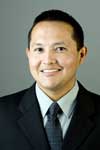
Clayton N. Wauneka
Clayton N. Wauneka in bioengineering is researching the development of novel devices and methods to improve current rehabilitation treatment for paretic upper limbs in stroke survivors. He is working with his adviser to develop a low-cost robot with an Internet-accessible control system that stroke survivors can use from home. His goals include starting a small company, working in industry or research and teaching. In 2007, Wauneka received bachelor’s degrees in electrical engineering and Spanish from New Mexico State University in Las Cruces. As an undergraduate, Wauneka interned at Raytheon Missile Systems in Farmington, N.M., and IBM in Austin, Texas. Before beginning graduate school, he worked for two summers as a technical aide at the Johns Hopkins University Applied Physics Lab. He has also done mission work in Paraguay. He is married to Kaitlyn Wauneka and is the son of Freddie and Jeanette Wauneka of Farmington.